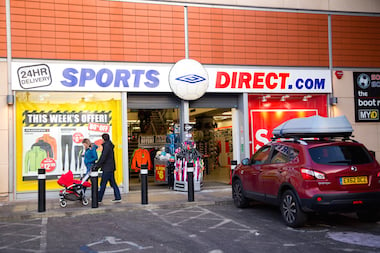Sports Direct: how not to manage a business

The sports retailer’s reputation continues to come under fire as CEO Dave Forsey reportedly resigns following accusations of mishandling staff redundancies and a new scathing BBC documentary
Jermaine HaughtonThought to be the first FTSE100 chief to be charged under the Trade Union and Labour Relations Act 1992 last Friday, Sports Direct CEO Dave Forsey has reportedly stepped down from his position ahead of a court appearance regarding a lack of notice on redundancies.
Initially due to appear at Chesterfield Magistrates' Court on August 15, he faces charges that he failed to properly inform authorities of plans to lay off around 200 workers from the Sports Direct-owned fashion chain West Coast Capital (USC) in January this year. The Daily Mail reports that Forsey resigned from Mash Holdings, the £2.7billion holding company for Sports Direct and founder Mike Ashley’s other sister companies, on August 1. The court hearing was adjourned to today.
During the pre-pack administration of USC, Sports Direct are alleged to have given redundant staff at its Scottish warehouse in Dundonald, South Ayrshire just 15 minutes' notice by administrators that they would be losing their jobs and that the company would be ceased.
UK employment laws dictate that employers must consult all employees who are at risk of redundancy as soon as possible, informing them of the situation and discussing with them any alternatives and the implementation of the redundancy situation with a minimum of a 30 day notice for 20-99 layoffs, and 45 days for 100 and over.
Sports Direct chairman Keith Hellawell told a Scottish Affairs Select Committee hearing in March this year, that he was only informed of USC’s administration a day before it was finalised. This is despite executive board members discussing it with administrators at least two months beforehand, the committee heard. USC has since reformed under Sports Direct control and recommenced its operations.
Sports Direct have declined to comment on the reports, but if Forsey is found guilty of breaking employment laws he could be fined up to £5,000 and banned from holding directorships for up to 15 years.
Company shares fell by 7% following the public confirmation by the Insolvency Service on October 9 regarding the ongoing investigation into Forsey. But this development is just one of many controversies which have struck the discount sportswear retailer.
Whether it be the use of the much-criticised zero-hour contracts for around 15,000 of its staff, to shareholder revolts against owner Mike Ashley’s share rewards, the company has become a constant fixture on UK business pages.
Dominant but aggressive
Led by the reclusive and media-shy Ashley, Sports Direct has taken a dominant and aggressive approach to building its brand as one of the biggest in the UK retail market, leading the discount sportswear market through successful acquisitions, a lean workforce and the dominance of its owner.
Liberum Capital's retail analyst Sanjay Vidyarthi believes Ashley's strength has been to keep rivals on the back foot. He told Reuters: "He's been a tremendous disruptive influence. The competition really just hasn't known how to deal with him."
In the year leading to April 2015, the chain’s sales grew by 4.7% to £2.8bn, despite the company claiming it was a "challenging" year of trading. Pre-tax profits also jumped by 21% compared to the previous year totalling £300m, £7m more than forecasts and investors and analysts are confident that the company will continue to outperform the market.
However, the aggressive and disruptive nature of Sports Direct’s management, which focuses heavily on growing its bottom line, has garnered more than its fair share of criticism from the media, trade unions and politicians alike for its poor handling of staff.
An in-depth expose by BBC TV series Inside Out revealed the chain’s incredibly strict working regulations that have created “a culture of fear” among its workforce. At the retailer’s warehouse in Shirebrook, Derbyshire, reporters found that Sports Direct employs staff through an agency that operates a ‘six strikes’ policy, whereby new workers can be sacked for simply taking too long in the toilet, talking to colleagues or taking too much sick leave.
The BBC quoted a document produced by an agency that supplies staff to Sports Direct, which said any person exceeding six unscheduled sick leaves within a rolling six-month period would have their assignment ended. These accusations contravene Government regulations which protect agency workers by insisting employers provide statutory sick pay, as well as statutory maternity and paternity pay. With more than 5,000 workers at the warehouse, the report revealed that over 80 calls to ambulances had been made from the site between January 2013 and December 2014, including an incident when a woman gave birth in toilets, with workers seemingly feeling compelled to work through illnesses
In response, the sports goods chain said "key identifiable allegations" in the BBC report were unfounded. Sports Direct added the two agencies that employ warehouse staff at its Shirebrook site operated a "performance strike" system that takes into account an employee's timekeeping, attendance, sickness, conduct and performance target levels.
A previous TV documentary by Channel 4’s Dispatches also pointed to the bad working practices at Sports Direct, which the Unite trade union likened to the ill-treatment of the working class in the Victorian era. In particular, investigators found that the company publicly shames employees who bosses think are not working hard enough by making tannoy announcements, in both English and Polish, naming workers who are deemed to be slacking.
While the negative media coverage has not seemingly stopped customers flocking to its stores, recent union protests, and the emergence of self-confessed socialist Labour leader Jeremy Corbyn, may be threats to the ruthless style in which the retailer is run.

Press & Media Enquiries
For more information or to request interviews, contact CMI's Press Team on 020 7421 2705 or email press.office@managers.org.uk


